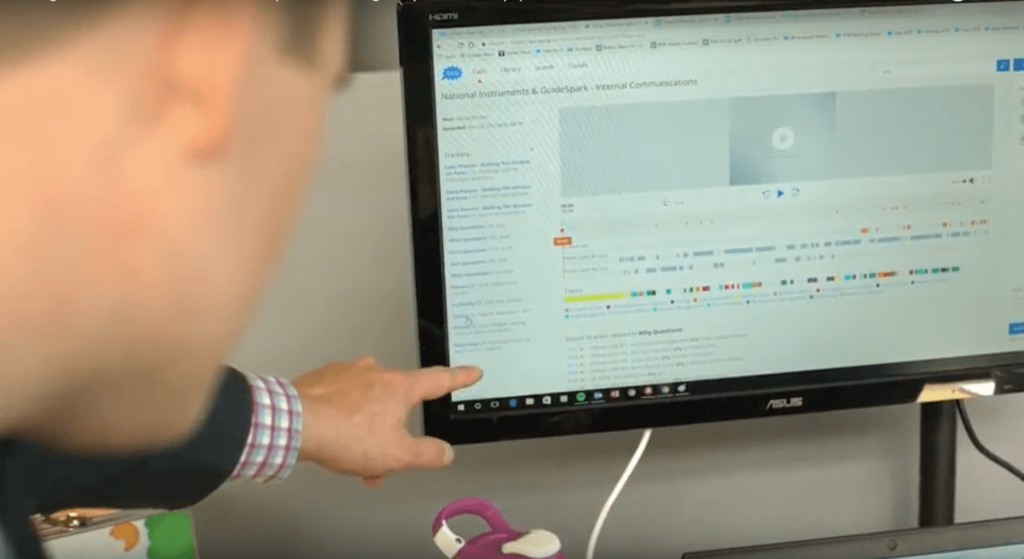5 Call Coaching Practices That Will Help Your AEs Nail Their Demos

I was writing so fast my hand started cramping.
23 minutes into an interview with Derek Grant on how they do their call coaching at SalesLoft, and I already had several pages of notes.
While many B2B sales organizations record calls and demos, few know how to make use of them.
Derek and his team are an obvious exception.
While I wish I could share everything he told me, here are five of the ways Derek and the SalesLoft team use call and demo recordings to help their account executives deliver crisp demos.
#1: Weekly “Point and Laugh”
Every Monday at 5 pm EST, Derek’s sales team gathers in a conference room, picks one of their account executive’s demo recordings at random, and reviews it “game tape style.”
They call this their “weekly point and laugh” meeting.
The entire team dissects the call, adds their insights, and as a result, everyone learns through “osmosis.”
Here’s how Derek describes those meetings:
“If you could see the number of times we start-stop-start-stop during one of these 5 pm meetings, you’d be blown away. Everything about a call or demo is studied and evaluated down to the specific word choice reps use. We are perpetually starting and stopping the recording to analyze what the rep said and the best way to approach future calls and demos.”
#2: Memorialize “Unicorn Demos”
Every day, SalesLoft account executives do demos that could be used as shining examples of how to sell better.
Whenever an AE has a “unicorn meeting” (as Derek calls them), they are saved to a “Unicorn Demo” call library for future reference.
These saved call and demo recordings are used in sales training sessions to help spread the knowledge across the entire team at once.
Individual AEs also listen to these recordings in their “down time” to learn from their peers’ best-ever sales calls.
#3: Reduce Sales Onboarding Ramp Time with Demo Recordings
Like I mentioned above, unicorn sales calls and demos are saved into a “hall of fame” call library.
When SalesLoft hires a new onboarding class of account executives, these new sales hires can access and review a “highlight reel” of unicorn demos.
This helps them shave off weeks of onboarding ramp time.
Hearing what their more experienced peers do on their sales calls answers 80% of new AE’s questions about their new role.
#4: Coach Key Moments
“Practice doesn’t make perfect. Perfect practice makes perfect.”
Coaching is good. Targeted coaching is better.
The sales leadership team at SalesLoft doesn’t always have time to review an entire demo recording.
Few sales leaders do.
Fortunately, there are only a handful of high-leverage “teachable moments” within each call. Derek focuses their coaching efforts by zeroing in on these key moments.
Instead of providing feedback at every possible opportunity throughout a call, Derek and his team keep their coaching feedback targeted to the highest leverage segments of a call: key discovery questions, how certain features are being messaged, etc.
Because of the targeted nature of this approach, AEs sharpen the most impactful sales skills, fast.
#5: “Binge Watch” Demos If You Haven’t Done It Yet
“Initially, we found ourselves binge watching demo recordings. As we got a feel for what our newest and most at-risk AEs were saying, we were able to identify and coach on how to best interact with each prospect.
Derek’s quote says it all. A visibility-starved sales leader who suddenly gets insight into what his or her reps are doing on their calls will usually binge on this new visibility.
Sales training sessions can be rooted in reality since understanding what happens on calls and demos helps Derek identify the team’s true training needs.
Five Down, Many More To Go
Coaching is becoming a hot topic in the B2B sales world.
We’re in the infant stages of formalizing processes that help us better coach our sales teams.
So what is your contribution to formalizing coaching best-practices?
In this article, I covered five of them that I was fortunate enough to learn second hand.
Comment below with your own call coaching practices.
